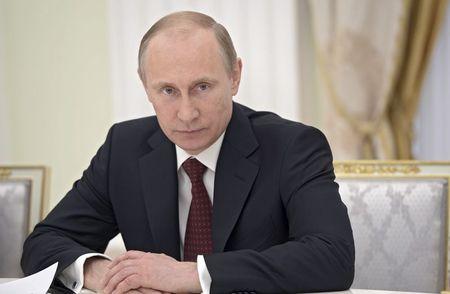DONETSK Ukraine/MOSCOW - Russian President Vladimir Putin called on pro-Moscow separatists in Ukraine to postpone a vote on secession just five days before it was to be held, potentially pulling Ukraine back from the brink of dismemberment.
It was the first sign the Kremlin leader has given that he would not endorse a referendum planned for Sunday by pro-Russian rebels seeking independence for two provinces with 6.5 million people and around a third of Ukraine's industrial output.
In what appeared to be a breakthrough in the worst crisis between East and West since the Cold War, Putin also announced he was pulling Russian troops back from the Ukrainian border. Moscow has massed tens of thousands of troops on the frontier, proclaiming the right to invade Ukraine if Russian speakers were threatened.
"We call on the representatives of southeastern Ukraine, the supporters of the federalisation of the country, to postpone the referendum planned for May 11," Putin said.
He said this would create conditions for dialogue between the Ukrainian authorities in Kiev and the separatists, some of whom want greater autonomy while others demand secession.
"We're always being told that our forces on the Ukrainian border are a concern. We have withdrawn them. Today they are not on the Ukrainian border, they are in places where they conduct their regular tasks on training grounds," Putin said.
He spoke in Moscow after talks with the head of the Organization for Security and Cooperation in Europe, who said the security and rights body would soon propose a "road map" to defuse the Ukraine crisis.
A pro-Russian separatist leader said the separatists would consider Putin's call to postpone their referendum at a meeting of their self-proclaimed People's Assembly on Thursday.
"We have the utmost respect for President Putin. If he considers that necessary, we will of course discuss it," Denis Pushilin told Reuters in Donetsk, a city of 1 million people which the rebels have proclaimed capital of an independent "People's Republic of Donetsk".
Russian share prices surged after Putin's remarks, seen as reducing the likelihood of damaging new sanctions. The MICEX index was up more than 3 percent on the day.
Ukraine's government and its Western allies have urgently sought to halt the referendum, which they feared would lead to a repeat of Russia's annexation of Crimea in March but on a much larger scale. U.S. Secretary of State John Kerry has called the proposed referendum "contrived and bogus".
Ukrainian government troops have launched a military campaign to retake territory held by separatists this week. Troops briefly captured the rebel-held city hall in the eastern port of Mariupol overnight, but quickly abandoned it, leaving it back in the hands of the separatists.
A week of violence in the east and in the southern city of Odessa, where more than 40 people died in clashes that ended with pro-Russian demonstrators trapped in a burning building, has hardened positions and spread the unrest.
The United States and European Union, which have so far imposed only limited sanctions Russian individuals and small firms, have threatened to impose much wider sanctions on Russian industry if Moscow took further steps to interfere in Ukraine.
Sunday's planned referendum was seen as a potential trigger for such sanctions.
Moscow denies orchestrating rebellion
Moscow has denied Western accusations that it was orchestrating the rebellion in Ukraine's east, where Ukrainian forces have been largely unable to reassert control.
In Mariupol, where Ukrainian forces briefly recaptured the rebel-held city hall overnight, witnesses said the soldiers left after smashing furniture and office equipment. The smell of tear gas hung in the air inside the building which was largely empty in the morning, with activists in gas masks clearing debris.
Pro-Russian activists were rebuilding barricades outside the building where separatist flags flew and patriotic songs blared from loudspeakers.
"They don't want us to hold our referendum, but it's our right. That's democracy," one man named Alexander said. "If this keeps going we won't even settle for federalisation," he added, referring to a proposal for regional autonomy within Ukraine.
"We could have negotiated but they won't even talk."
The prospect that further sanctions might be imposed on Moscow has already hurt Russia's economy indirectly by scaring investors into pulling out capital and forcing the central bank to raise interest rates to protect the rouble.
A range of European companies that do business in Russia - as diverse as Italian appliance maker Indesit, Danish brewer Carlsberg, Finnish tyre maker Nokian Tyre and Swedish cosmetics firm Oriflame - announced results on Wednesday that blamed the crisis for hurting their bottom lines.
French bank Societe General wrote down the value of its Russian arm Rosbank by $730 million, blaming the economic uncertainty caused by the Ukraine crisis.
Russia's Finance Ministry predicted on Tuesday that the economy would shrink for a second quarter in a row, putting the country officially in recession.






















































